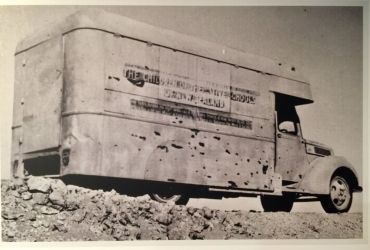YMCA WWII Canteen Truck Te Rau Aroha
Throughout World War II, the YMCA was responsible for providing support, assistance and comforts to Kiwi soldiers. The YMCA, or Young Men's Christian Association, is an international and interdenominational welfare organisation which was established in New Zealand in 1855. During the war, YMCA mobile canteens in trucks followed units on campaign, distributing a wide assortment of comforts, including cigarettes, chocolate and books.
There was one YMCA mobile canteen which became unique amongst the YMCA trucks and Te Rau Aroha was the name given to it. This truck features in the critical as well as the creative portion of Lynda's thesis (currently unpublished). Lynda was fortunate to be able to look closely at Te Rau Aroha, as it is currently a treasured artefact in the care of the National Army Museum (NAM) in Waiouru. The curator of vehicles showed Lynda how the truck functioned as a canteen, shared a number of anecdotes about the truck, and spoke of its importance to the 28 (Maori) Battalion and other infantry personnel who served alongside that unit. Lynda noted the repaired battle scars and wounds on the truck and thought how they mimicked the mental and physical scars of returning soldiers.
It occurred to Lynda that possibly her father visited Te Rau Aroha during his wartime service with 24 Battalion, 6th Infantry Brigade. Possibly he sat with other soldiers around the truck, sipping hot tea on cold evenings and listening to an acquired radio or the strumming of guitars. For hundreds of Kiwi soldiers, Te Rau Aroha served as a connection to home and was an oasis in war torn areas. This fact has been borne out in a number of books written by military historians, as well as online articles about Te Rau Aroha. Whilst researching Te Rau Aroha, Lynda developed a strong belief that many soldiers developed a deep emotional connection to this particular vehicle.
Te Rau Aroha was gifted to the 28 (Maori) Battalion by children of the Native Schools of New Zealand after extensive fundraising, thus providing a connection point between generations. During the war it provided a wide assortment of items, including tinned traditional food staples, such as oysters, mussels and toheroas. Tastes from home, far from home.
At the end of the war, the 28 (Maori) Battalion were adamant that Te Rau Aroha return to Aotearoa with them. Therefore, with special permission obtained from General Freyberg and the captain of the Dominion Monarch - the ship commissioned to take the Battalion home - space was made for what had become, and what has remained, a beloved vehicle.
(Note: Photos are from Lynda's personal collection and she acknowledges the cooperation of NAM staff.)
